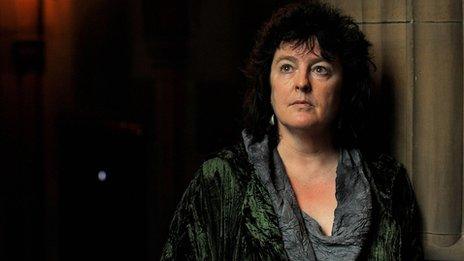Dame Carol Ann Duffy's local bookstore crusade
- Published
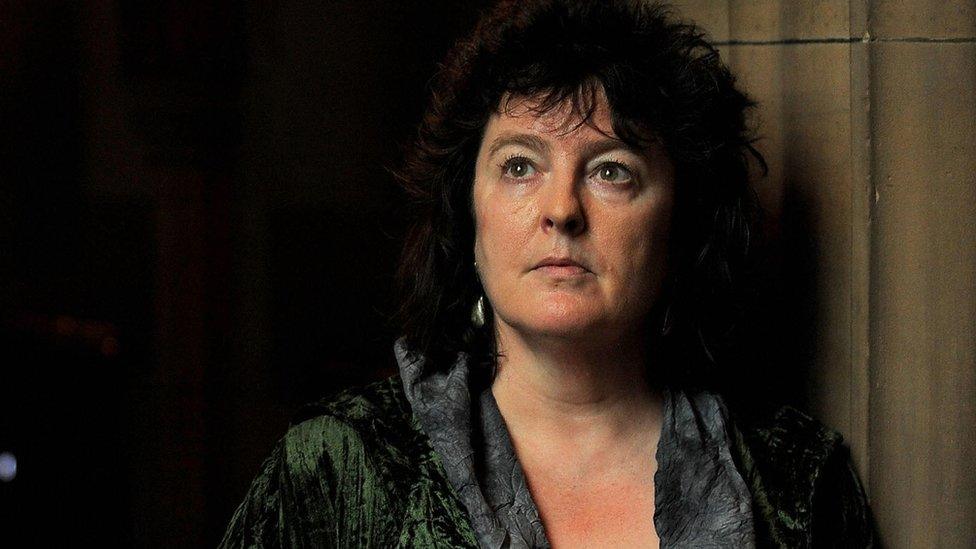
Dame Carol Ann Duffy says the poetry and music tour has received a lot of support from booksellers and the public in each venue
The number of independent bookstores in the UK is in decline and often those that prosper have worked to build a community based on reading groups and author visits. Britain's poet laureate Dame Carol Ann Duffy has set off on a reading tour of 15 venues to support those shops, but she and her travelling band of bards are deliberately avoiding big cities in favour of Britain's towns and villages.
It's not often the Princess Pavilion in Falmouth is graced by a gaggle of poets. The posters outside are mainly for one-off concerts by tribute acts, ranging from David Bowie to Patsy Cline.
But, to the obvious delight of a capacity crowd, Dame Carol Ann, and fellow poets Jackie Kay, Imtiaz Dharker and Gillian Clarke are the real thing. On a rainy afternoon in Cornwall, the Shore to Shore poetry tour is creating electricity.
Dame Carol Ann has been poet laureate since 2009. "Whenever I do a reading, the local independent bookstore will almost always be there afterwards, selling poetry," she says.
"It's an act of love on their part and for years I've thought they should get something in return."
Venues for readings to come include the likes of Bridgnorth, Caernarfon, St Andrews and Carlisle Cathedral. The poets (plus musician John Sampson) are criss-crossing Britain in a people-carrier driven by the publicity team.
If the concept of a bardmobile isn't ambitious enough, in each location they will be joined by a fifth, local poet (who in Falmouth was Penelope Shuttle).
Each event lasts a couple of hours and ends with a book signing - the tour coincides with Independent Bookshop Week. Fans can pick up individual works but there's also a new anthology called Off the Shelf - A Celebration of Bookshops in Verse.
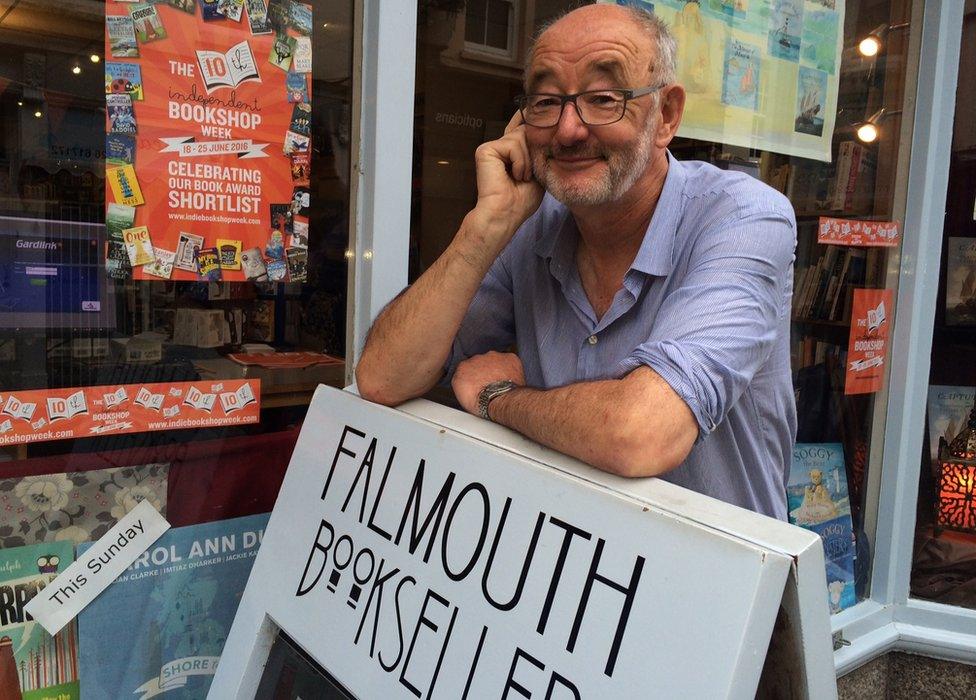
Falmouth bookshop owner Ron Johns says he's managed to survive by having a shop in a well-visited seaside town
As you might expect, it's a love letter to the idea of buying your book surrounded by bricks and mortar rather than online. A number of the poems recall the influence of bookshops, mainly now closed, on young lives.
Ron Johns has owned Falmouth Bookseller for a quarter of a century. "When I first came I was sure I'd chosen the wrong location. But later, as some other independents started to struggle, I realised one of the things that can save you is being in a destination town," he says,
"Falmouth is a lively working place anyway and it has university students too. But also it gets tourists in summer which is useful if you're selling books.
"Often we'll carry a book which a big chain might not bother with. And we're very strong on books with a local Cornish connection. Poldark's been a big seller for us so we're looking forward to the new series starting. We know our regulars well and they trust us to recommend books.
"There's nothing wrong with the WH Smiths and Waterstones of this world - they're good at what they do. But diversity matters and everyone in bookselling knows it's under pressure."
The latest survey shows there are slightly under 900 independent bookstores in the UK but only 12 years ago, the figure would have been nearer 1,500.
Independent bookshops sell only around 10% of books bought in the UK. By comparison, Amazon have around 25% of the market - a figure matched by WH Smith. Waterstones sell around 20% while the final 20% is made up of sales in supermarkets and elsewhere.
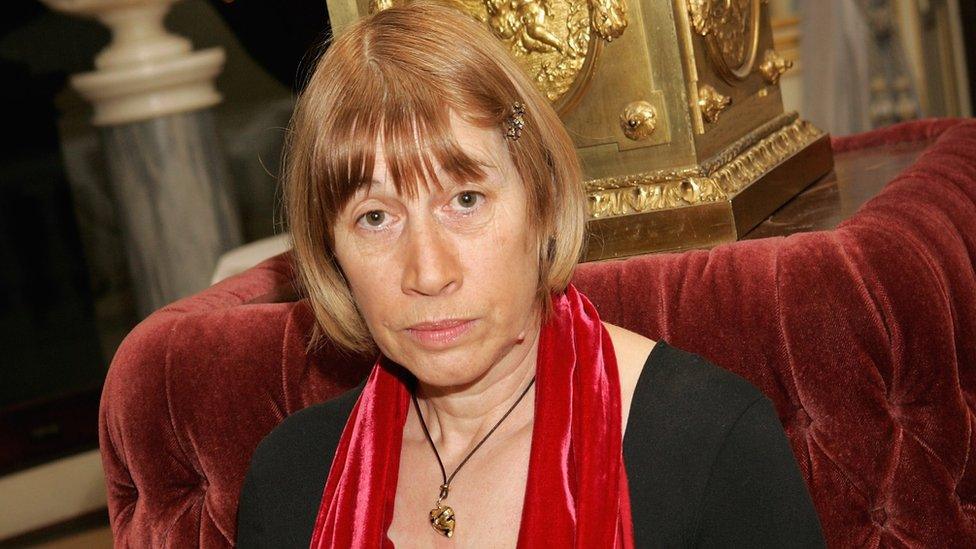
Penelope Shuttle is just one of the local poets who join the tour as it travels around the country
Lisa Campbell writes about the trade for The Bookseller. She says retailers who have survived the downturn are often those who have embraced what she calls "retail theatre".
"It would be very hard to get rich selling poetry. But there are some new entrants into the field who realise that going into a bookshop can be an event in itself.
"Buying from Amazon or any online retailer is a pretty sterile experience - though their breadth of stock and the ability to discount will always give them advantages.
"But if you can actively enjoy going into a bookshop - if the design and the customer service make it a rewarding experience - then those shops will do well.
"However, the number of independent shops is still shrinking. Last year there were 46 closures in the UK to set against 23 openings.
"One thing that's happening is that people who perhaps set up shop 30 years ago - when maybe things were a bit easier with rents - are deciding to close. They just can't keep up with the rapid and relentless pace of change and they decide it would be nice to retire.
"There are new owners coming into the business too, but they need energy and realism. Online sellers discount ruthlessly so bookshops can rarely compete on price alone. So it's brilliant to see Carol Ann Duffy using her popularity as a poet to make something like Shore to Shore happen."
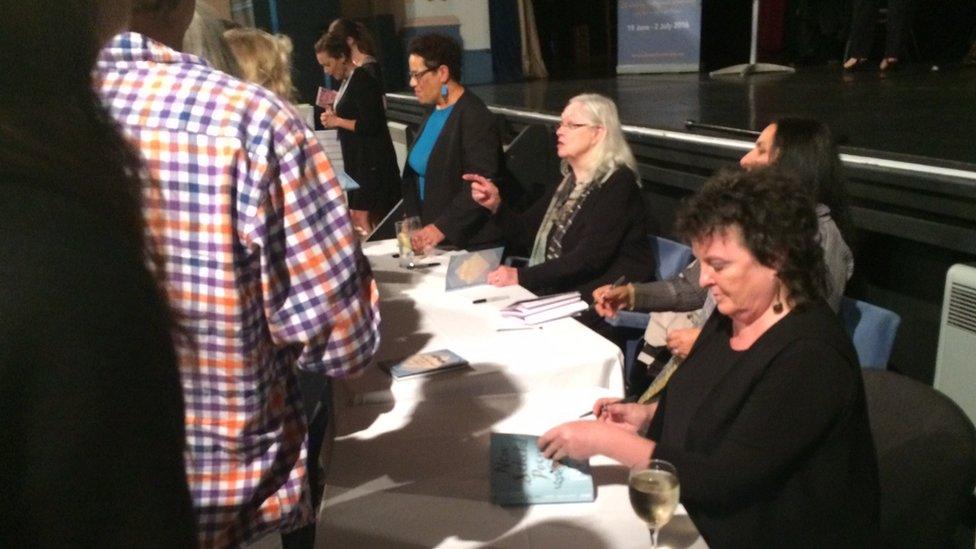
The tour has come at a 'pertinent' time says participating poet Jackie Kay: "Poetry has always had a voice at difficult times, like those we're in," she adds
The current poet laureate has struck a chord with the public - including those who rarely take an interest in contemporary poetry. But in Falmouth it's obvious the audience is enjoying watching everyone on stage.
All talk in their introductions about what they see as a particularly dark period in public life. They're referring both to the killing of Jo Cox MP and to the shootings at the Pulse nightclub in Orlando.
Gillian Clarke, who has just ended an unprecedented eight years as the National Poet of Wales, read out her poem Daughter which originally she wrote about the death of the young Welsh girl April Jones.
"Clearly the poem is not about Jo but it is about a beautiful and loved person who has been taken from us. I think if someone publicly talks about an event like this, others will think that's how they feel but perhaps they've had no opportunity to express the thought. Poetry is part of our common language."
Jackie Kay this year became the Scots Makar - in effect the Scottish poet laureate. She agrees the tour has come at a pertinent time.
"Poetry has always had a voice at difficult times, like those we're in. It's not that any of us is likely to run off and immediately write a poem about Jo Cox or about what happened in Orlando. Those events just floored everybody but a poem takes time to cook.
"But poetry can offer an alternative to the hate you find in too much public life at the moment."
Imtiaz Dharker is the only one of the quartet who hasn't yet been awarded a laureateship, although Dame Carol Ann says she's already "poet laureate to the world". She thinks there's been a general coarsening of language in a lot of political debate, in Britain and elsewhere.
"In fact you could say there's been a coarsening of thought. There has been a terrible lack of nuance in debate.
"Poetry uses language more thoughtfully and without the shrillness you can get in politics and public life. Poets can bring us back to thinking about ideas. Carol Ann's idea of going on tour like this was always a great one. It turns out to be a great idea at exactly the right time."
The Shore to Shore tour runs until 2 July.
- Published18 April 2016
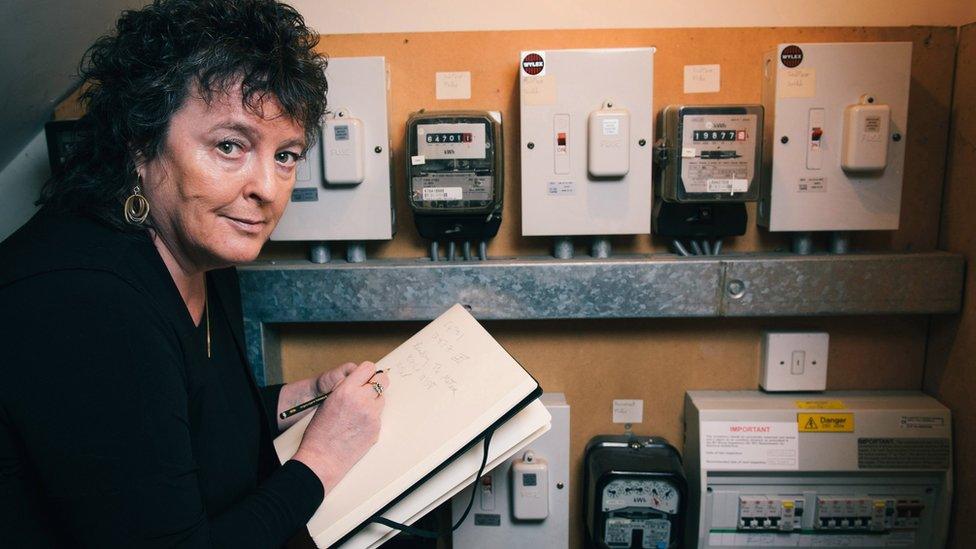
- Published13 July 2012
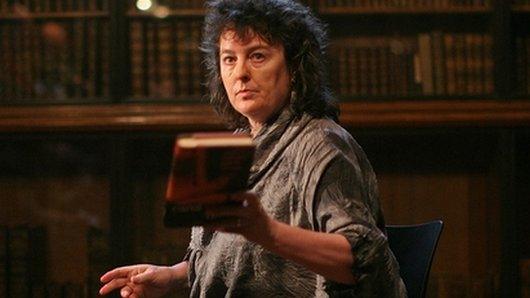
- Published3 January 2012
